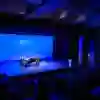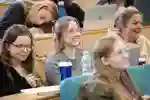


Learn how to craft a jaw-dropping plot twist – and how to bring it to life on screen. This course gives you the skills and knowledge to turn your passion for writing and film into a career.
You’ll explore a range of forms including scriptwriting, non-fiction, short stories, the novel, and poetry. And you’ll experiment with all kinds of genres – from fantasy and science fiction, to myth and fairytale.
Creativity lives and breathes at Hull. Always has done, always will. So you’ll be joining a University with a strong heritage in writing and film, and a buzzing literary and creative scene.
About this course
Our course will develop your confidence in your writing through core skills and techniques. You’ll experiment with scriptwriting, non-fiction, short stories, the novel, and poetry. As well as genres from fantasy and science fiction to myth and fairytale. And you’ll learn how to approach film and television as art, history, culture, entertainment and commerce.
You’ll have opportunities to get involved in Hull’s writing and film culture beyond your studies. Students have shared their work through readings, performances and publications, including initiatives such as HUWrites, which offers platforms for showcases and student-led podcasts. There have also been opportunities to design, edit and publish for our in-house magazine, Document 1.
And in film, you’ll get the chance to earn CV-boosting experience on a placement. This could be through our involvement with Screen Yorkshire's Connected Campus. It’s a scheme that can help prepare you for life in the film and TV industry through masterclasses, workshops and visiting speakers.
Want to make your mark? Here's a pen
Module options
Each year, you’ll study modules worth a certain number of credits, and you need 120 credits per year. Most modules are 20 credits – so you’ll study six modules each year. Some longer modules, such as a dissertation, are worth more. In these cases, you’ll study fewer modules - but the number of credits will always add up to 120. Some modules are compulsory, some are optional, so you can build a course that’s right for you.
Filters
The Writer’s Toolkit
The Universe is made of stories, not of atoms’ – Muriel Rukeyser. This module will help you to nourish the writer within you, and introduce you to the key concepts that will allow your imagination to flourish through writing exercises, workshops and advice from published writers.
compulsory
20 credits
Introduction to Filmmaking
On this hands-on module, we'll introduce you to our extensive technical resources. But more importantly, we'll teach you how to choose the right tool for each job. How to coordinate action and understanding among your whole crew, so you can succeed in the most fundamental filmmaking task: solving creative problems.
You’ll develop your creative practice skills and learn the fundamentals of practical filmmaking. Whether you’re making film or professional online content, understanding established filmmaking techniques and practice are essential for success. We’ll guide you through a range of film production techniques, processes and methods.
So, by the end, you’ll be well prepared to tackle the rest of your degree. But more than that, you’ll have the skills to take your first steps toward becoming an industrial and recognised film professional.
compulsory
20 credits
Screen Storytelling
Learn how structure and style shape film narrative through classroom- and studio-based learning.
compulsory
20 credits
Facts into Art
Discover how to convert real life into good storytelling. Extend your creative writing skills by generating ideas from daily life, and crafting them into well-conceived, skilled pieces.
compulsory
20 credits
Poetry, Performance, Play
Do you love the sound of words, the rhythm of poetry and the power of the human voice? Then this module is for you. Join us to learn how to craft your words into shape as you play with form and perform your own monologues, sonnets, haiku and more, letting your words travel out through the dark.
compulsory
20 credits
Screening Identities
How are gender and other aspects of identity represented on screen? Explore the variety and the ethical implications of screen media’s engagement with identity politics.
compulsory
20 credits
Collaborative Creative Project
Creative project management will explore the key methods used in a broad range of creative industries to organise and manage complex projects.
core
20 credits
Scriptwriting
Want to see your story come to life on stage or screen? This module is your chance to make it happen.
You’ll dive into key elements like story, plot, character development, dialogue, structure, and adaptation.
You'll hone your skills in giving and receiving feedback, refining your craft, and growing as a writer.
You’ll work closely with other creatives, sharing ideas, inspiring each other and pushing one another to reach your full potential.
By the end, you'll have the tools and experience to turn your ideas into powerful scripts that can captivate audiences. Ready to bring your story to life? So are we.
core
20 credits
The Short Story
Do you love reading, writing or listening to short stories? Immerse yourself in classic and contemporary stories, learn about how writers deliver their magic, using limited word counts to make every word sing. Go on to craft your own stories, drawing on the limitations of the form to turn it into a strength.
optional
20 credits

The end of your story is just the beginning
Featured module
- core
- 20 credits
Want to see your story come to life on stage or screen? This module is your chance to make it happen.
You’ll dive into key elements like story, plot, character development, dialogue, structure, and adaptation.
You'll hone your skills in giving and receiving feedback, refining your craft, and growing as a writer.
You’ll work closely with other creatives, sharing ideas, inspiring each other and pushing one another to reach your full potential.
By the end, you'll have the tools and experience to turn your ideas into powerful scripts that can captivate audiences. Ready to bring your story to life? So are we.
Our facilities

Watchlist
Dr Ed Hurst
Course overview
2 mins
Your course in their words
Student Story
2 mins
Your course in their words
Student Story
2 mins
Life on campus
University life
2 mins
Featured academics
They’re not just experts, they're fans too. And their passion is infectious. You’ll learn alongside published poets, fiction writers, scriptwriters and scholars.
We’re part of the Larkin Centre research group. In REF 2021, 93% of our research was ranked world-leading or internationally excellent.2

Dr Chris Westoby
Lecturer
Chris’s debut novel, The Fear Talking: The True Story of a Young Man and Anxiety, explores his personal experiences of growing up with anxiety. He lectures in creative writing, gives guest lectures on mental health, and teaches reflective writing.
Entry Requirements
What do I need?
This course is currently available through Clearing, which means our entry requirements are a bit different to what they would normally be.
At Hull, you're a name not a number. During Clearing, we look at all of your qualifications and experience, not just your academic grades. We may be able to offer you a place whatever your situation. Get started by completing our eligibility checker, and find out immediately if you could study at the University of Hull.
Have questions? Our admissions team will be happy to help.
Fees & Funding
How much is it?

Future prospects
You'll build a varied portfolio of work throughout your degree. And you’ll gain the skills and adaptability to flourish in various arenas. You can go on to work in film, TV and the theatre as a playwright, director, scriptwriter or presenter. Or pursue a career in publishing, advertising or marketing.
The ability to showcase a creative mind through writing is a rare skill. Being able to tailor your messaging for different audiences will also give you a powerful advantage. Especially if you combine your professional portfolio with job-ready skills gained from work experience.
Become part of the next generation of futuremakers
Like what you've seen? Then it's time to apply.
The standard way is to apply through UCAS. This will give you the chance to showcase your skills qualities and passion for the subject, as well as providing us with your academic qualifications.
Not ready to apply yet?
Visit our next Open Day, and see all that the University of Hull has to offer. Talk to our lecturers about your subject, find out what university is really like from our current students, and take a tour of our beautiful campus and amazing facilities.
You may also be interested in...
Creative Writing is ranked number 1 in the UK (HEIs) for academic support. National Student Survey (NSS) 2025, HEIs only.
Creative Writing is ranked in 1st place in the UK for Student Satisfaction. Complete University Guide 2026.
93% of our research was ranked world-leading or in internationally excellent. Research Excellence Rankings 2021
All modules presented on this course page are subject to availability and this list may change at any time.